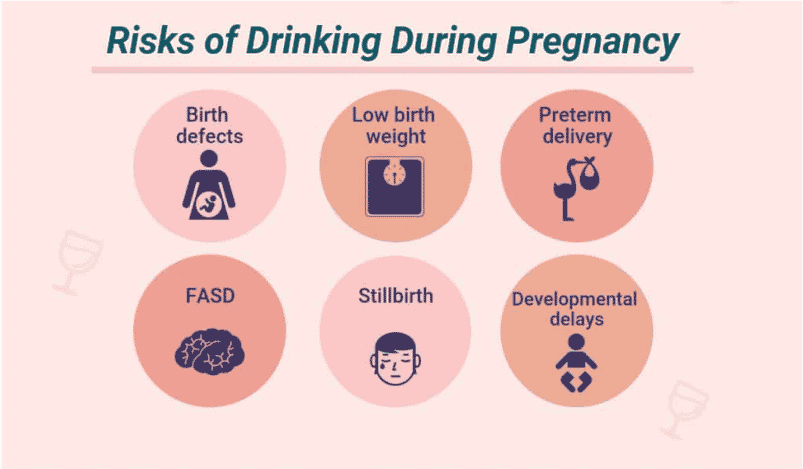
As an adult with fetal alcohol syndrome, you’re going to be facing a series of uphill battles. Fetal alcohol syndrome, or FAS, is a group of overlying conditions and signs that point to the condition.
Below we highlight what fetal alcohol syndrome is, the long-term effects of FAS, how you can prevent fetal alcohol syndrome from occurring, and the treatment options you’ll have available.
What Is Fetal Alcohol Syndrome?
Every single year thousands of babies across America are born with FAS, a preventable fetal alcohol spectrum disorder (FASD).
Fetal alcohol syndrome occurs when the mother drinks during pregnancy and the developing fetus is exposed to alcohol. Some common symptoms that arise from FAS include slower development of the child, growing less quickly than children their age, mental retardation, and other facial abnormalities.
This Season, Give Yourself the Gift of a Fresh Start.
Whether you are struggling with addiction, mental health or both, our expert team is here to guide you every step of the way. Don’t wait— reach out today to take the first step toward taking control of your life.

Causes of Fetal Alcohol Syndrome
FAS develops when alcohol consumed by a pregnant individual crosses the placenta and affects the developing fetus. Alcohol disrupts normal growth patterns, leading to alterations in the brain, facial structure and overall physical health. A few key factors influence the likelihood and severity of FAS:
- Timing of exposure: Drinking alcohol during the first trimester is often linked to major structural changes, whereas use during later trimesters can have lasting impacts on brain development and organ growth.
- Frequency and amount of alcohol consumption: Heavy drinking or binge-drinking episodes significantly raise the risk of FAS, but even moderate levels can be harmful.
- Genetic and environmental factors: Genetic predisposition, maternal health status and a supportive environment can all affect the severity of outcomes associated with FAS.
Childhood Symptoms of Fetal Alcohol Syndrome
In many cases, signs of FAS first become evident during childhood, including:
- Distinctive facial features: Children with FAS may have a thin upper lip, a smooth philtrum (the ridge between the nose and upper lip) and smaller eye openings.
- Growth deficits: Low birth weight and stunted growth can be early indicators.
- Learning difficulties: Children may struggle academically, particularly with math, reading and comprehension.
- Behavioral and social challenges: They might exhibit hyperactivity, poor impulse control and difficulty forming peer relationships.
- Alcohol-related birth defects (ARBDs): Children may have issues with their kidneys, heart, bones, eyes, and ears.
However, some children with milder features may not receive a formal diagnosis, leading to the possibility that they enter adulthood unaware of their condition or lacking the support they need.
How Is FAS Diagnosed in Adults?
Diagnosing FAS in adulthood can be challenging. Children with FAS typically have more distinctive physical features than adults with FAS do. Adults may have developed coping strategies that mask certain signs, or they may have incomplete prenatal and childhood medical records. Diagnosis typically involves:
- Review of medical history: A thorough assessment of prenatal exposure to alcohol, developmental milestones and childhood health records.
- Neuropsychological testing: Evaluations can identify learning disabilities, attention deficits or executive functioning problems.
- Physical examinations: Clinicians may look for key facial characteristics or other physical indicators consistent with FAS.
- Collaboration with specialists: Geneticists, psychologists and other healthcare providers often work together to rule out conditions that present similarly.
A proper diagnosis in adulthood can help individuals access support services, therapy and other resources that improve their quality of life.
Physical Signs and Effects of FAS in Adults
Some physical traits and health concerns can persist into adulthood, including:
- Distinctive facial features: While facial differences may become less pronounced over time, subtle signs often remain.
- Growth and stature: Adults with FAS may be shorter and weigh less than their peers.
- Organ and immune issues: Heart, kidney or skeletal problems can develop or continue into adulthood, sometimes exacerbated by poor access to healthcare or lack of awareness.
- Chronic health complications: Some people face a higher risk of diabetes, high blood pressure and other conditions related to metabolic dysfunction.
Mental Health and Behavioral Challenges in Adults With FAS
Mental health concerns affect 90% of people with FAS, including adults. FAS often affects the brain’s structure and function, leading to ongoing cognitive and emotional challenges, such as:
- Impaired executive functioning: Difficulty with planning, organization and decision-making can make independent living or employment more challenging.
- Attention and memory issues: Adults may struggle with concentration, forgetfulness and learning new tasks.
- Mental health disorders: Anxiety, depression and mood swings are common and may relate to the stress of coping with daily challenges.
- Difficulty with social cues: Trouble interpreting body language, tone of voice or social norms can affect relationships, employment and overall quality of life.
Additionally, children who have no physical abnormalities but experience mental or behavioral concerns may be struggling with alcohol-related neurodevelopmental disorder (ARND).

Secondary Conditions of FAS in Adults
Because of the complex interplay of cognitive, behavioral and physical challenges, adults with FAS are at a heightened risk for secondary conditions, including:
- Substance abuse: Difficulty coping with anxiety, depression or social isolation can lead to alcohol or drug misuse. Research shows that 60% of adults with FAS struggle with alcohol or drug dependence.
- Legal and financial troubles: Impulse control issues and challenges understanding social norms may increase the likelihood of involvement with the justice system or chronic unemployment. Studies show that 87% of adults with FAS have never had a regular job, and 70% are currently unemployed.
- Homelessness: Unstable relationships, limited employment options and mental health issues can make it difficult to maintain stable housing.
- Chronic mental health struggles: Untreated anxiety, depression or post-traumatic stress can worsen over time without appropriate intervention and support.
- Struggles with daily living: 80% of adults with FAS require assistance with daily activities, and 66% live in assisted living homes or other institutional environments.
Preventing Fetal Alcohol Syndrome
Fetal alcohol syndrome is caused by a woman drinking during her pregnancy. When a woman drinks while pregnant, the blood travels through her body, through the placenta, to the developing fetus. Since a fetus will break down alcohol much slower than an adult, the alcohol will stay in the body much longer, which is what causes FAS.
Women who consume high levels of alcohol during pregnancy increase the risk of their child developing FAS. However, even small amounts of alcohol have been linked to fetal alcohol syndrome. If you’re pregnant, the only way to ensure that fetal alcohol syndrome doesn’t develop is to refrain from alcohol completely.
Treatment Options for FAS in Adults
There are no known treatment options for FAS that will actually reverse the condition. However, children who are diagnosed at a young age, usually before the preschool years, have a better chance at overcoming some of the symptoms due to a customized education and development plan.
Self-Assessment: Are You an Alcoholic?
If you’re about to become a parent or have a pregnant loved one who struggles with alcohol, then it’s important to seek out alcohol addiction treatment as soon as possible. The only way to prevent FAS is to stop drinking. If you, or a loved one, is a heavy drinker, then an alcohol/drug detox might be necessary to get the recovery process started.
The Recovery Village at Palmer Lake has a proven track record of providing caring and successful alcohol abuse treatment at our facilities in Palmer Lake, Colorado. Contact one of our team members today to learn how alcohol rehab can benefit you help prevent FAS. Get in touch with our team of alcohol addiction and recovery experts to prevent fetal alcohol syndrome from occurring.









